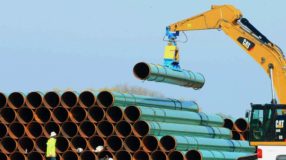The American Public Gas Association, American Petroleum Institute, Independent Petroleum Association of America, Interstate Natural Gas Association of America and the Natural Gas Supply Association of America, released the following statement ahead of the Federal Energy Regulatory Commission’s (FERC) New England Winter Gas Electric Forum being held September 8, 2022, in Burlington, Vermont. The group collectively represents most of the U.S. natural gas network and shares a longstanding commitment to working with FERC, power market customers and all impacted stakeholders to ensure resilience and reliability as New England and other regions transition to lower emissions.
New England is at a pivotal crossroads and faces very real, crucial issues that we urge this forum to address to ensure there is sufficient natural gas infrastructure available to serve the needs of power generators in addition to the utilities, manufacturers, businesses and households that rely on natural gas and who also require and deserve reliable service.
Dramatic changes in the resource mix for electricity generation – not only in New England but across the country — make the availability of natural gas essential. New England’s ability to make a timely transition to lower emissions energy hinges on the flexibility and reliability of quick-ramping natural gas and sufficient natural gas capacity to handle increased ramping demand.
In ISO-NE’s own words: “Without adequate gas, the region may not be able to meet the demand for home heating and electricity – and, when reliability suffers, the clean energy transition suffers.”
Maintaining reliability, particularly in New England, will require electric regulatory reform to ensure sustainable supply procurement practices and sufficient pipeline capacity to meet the growing demands heading into the winter months. Generators are hampered by their inability to recover fixed costs under the existing least-cost structure, substantially reducing their ability to invest in the natural gas infrastructure needed to provide the flexibility that the market requires. No amount of communication will create additional pipeline capacity. This is a physical constraint issue.
The current power market structure also fails to provide generators with certainty around when they will be needed, making natural gas generators hesitant to make advance longer-term arrangements for their fuel supply. Short-notice fuel procurement practices are not conducive to building a portfolio to develop reliable operations.
Addressing these fundamental disconnects in the market is the first and most critical step to bolstering reliability in New England. Eliminating the current bottlenecks in pipeline capacity will also help mitigate costs to New England consumers, who pay some of the highest energy rates in the country.
We hope this forum will provide an avenue to discuss market design improvements and to develop sufficient natural gas infrastructure for power customers in addition to the manufacturers, businesses, and households that rely on natural gas to power their everyday needs.
####
APGA is the trade association for more than 730 communities across the U.S. that own and operate their retail natural gas distribution entities. They include not-for-profit gas distribution systems owned by municipalities and other local government entities, all locally accountable to the citizens they serve. Public gas systems focus on providing safe, reliable, and affordable energy to their customers and support their communities by delivering fuel to be used for cooking, clothes drying, and space and water heating, as well as for various commercial and industrial applications.
API represents all segments of America’s natural gas and oil industry, which supports more than 11 million U.S. jobs and is backed by a growing grassroots movement of millions of Americans. Our approximately 600 members produce, process and distribute the majority of the nation’s energy, and participate in API Energy Excellence®, which is accelerating environmental and safety progress by fostering new technologies and transparent reporting.
INGAA represents the U.S. natural gas pipeline industry. INGAA’s members deliver clean, abundant, affordable natural gas throughout North America and operate approximately 200,000 miles of pipelines that serve as an indispensable link between natural gas producers and consumers.
The Independent Petroleum Association of America (IPAA) is a national upstream trade association representing thousands of independent oil and natural gas producers and service companies across the United States. Independent producers develop 91 percent of the nation’s oil and natural gas wells. These companies account for 83 percent of America’s oil production, 90 percent of its natural gas and natural gas liquids (NGL) production, and support over 4.5 million American jobs.
The Natural Gas Supply Association (NGSA) represents integrated and independent companies that supply natural gas. Founded in 1965, NGSA is the only national trade association that solely focuses on producer-marketer issues related to the downstream natural gas industry. NGSA advocates for well-functioning markets that foster a growing, competitive market for natural gas. NGSA is dedicated to achieving a cleaner future through strong partnerships with renewables and supporting innovative technologies and market solutions that reduce emissions.







